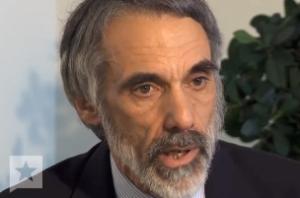Neil Gorsuch's record is fairly sparse and doesn't illuminate much more than an awareness of the ridiculous current state of pot policy. Well, that and a certain deference to law enforcement.
The power to commute prison sentences is rarely exercised at the state level. Anthony Papa's newest memoir makes an implicit case for it to be used much more often.
Sentencing and other criminal justice reforms advanced in the Obama years, but now there's a new sheriff in town. What are the prospects for criminal justice reform during the Trump presidency?
Arkansas legislators are trying to ban medical marijuana smoking and edibles, a new Florida bill seeks to revamp that state's medical marijuana system, and more.
Jail and prison guards are dropping like flies, a Border Patrol agent heads for prison for helping a cartel, a Louisiana cop develops a case of sticky fingers, and more.
It's all weed news today, even from the Middle East. State legislatures are taking up marijuana-related bills, and Israel is moving to decriminalize it.
The leader of the nation's largest drug reform group steps down, Maine becomes the eighth legal marijuana state, Seattle approves safe injection sites -- and isn't asking federal approval -- and more.
Technical issues stopped us from publishing yesterday and delayed us today, but the news didn't stop. Here's a couple days worth of mainly, but not entirely, marijuana policy news.
The Senate Judiciary Commitee has approved the nomination of Sen. Jeff Sessions to be attorney general, a legalization bill pops up in Wyoming, a Florida bill that would fix the state's medical marijuana system has the support of the folks behind the constitutional amendment, and more.
Regulators and legislators continue to mess with the will of the voters when it comes to implementing marijuana initiatives, the Philippines' president makes more bloody-minded threats, and more.
Marijuana-related legislation is moving in several states, the HIA is suing the DEA over hemp foods, Philippines Catholic bishops speak out against drug war killings, and more.
Donald Trump threatens the career of a Texas state senator over asset forfeiture, Chris Christie vetoes an asset forfeiture reporting bill, NYC marijuana arrests jump, Rhode Islanders are ready to legalize it, and more.
This article was produced in collaboration with AlterNet and first appeared here.
Where does Donald Trump's pick for the Supreme Court come down on weed? The record is pretty sparse.
Neil Gorsuch hasn't made any known public pronouncements about marijuana policy, and despite his tenure on the 10
th US Circuit Court of Appeals in Denver, he hasn't ruled in any cases that directly take up the issue.
But he has ruled on some marijuana cases, and he didn't go out of his way to support freeing the weed in them. And there's at least one marijuana-related case he's ruled on that demonstrates a disquieting deference to law enforcement.
In Feinberg et al. v. IRS, Gorsuch ruled against a Colorado dispensary that sought not to report data about its operation to the IRS because marijuana remains illegal under federal law and it feared incriminating itself. But in passing, he offered some commentary on the legal weirdness of state-legal but federally illegal marijuana commerce.
"This case owes its genesis to the mixed messages the federal government is sending these days about the distribution of marijuana. Officials at the Department of Justice have now twice instructed field prosecutors that they should generally decline to enforce Congress's statutory command when states like Colorado license operations like THC. At the same time and just across 10th Street in Washington, D.C., officials at the IRS refuse to recognize business expense deductions claimed by companies like THC on the ground that their conduct violates federal criminal drug laws. So it is that today prosecutors will almost always overlook federal marijuana distribution crimes in Colorado but the tax man never will."
And he marveled at the federal government's contortions as it sought to accommodate commerce in a substance it considers illegal.
"Yes, the Fifth Amendment normally shields individuals from having to admit to criminal activity. But, the IRS argued, because DOJ's memoranda generally instruct federal prosecutors not to prosecute cases like this one the petitioners should be forced to divulge the requested information anyway. So it is the government simultaneously urged the court to take seriously its claim that the petitioners are violating federal criminal law and to discount the possibility that it would enforce federal criminal law."
Gorsuch also pointedly noted the provisional nature of the Obama administration's decision to work with -- instead of against -- the states experimenting with marijuana legalization.
"It's not clear whether informal agency memoranda guiding the exercise of prosecutorial discretion by field prosecutors may lawfully go quite so far in displacing Congress's policy directives as these memoranda seek to do. There's always the possibility, too, that the next... Deputy Attorney General could displace these memoranda at anytime."
This is, of course, something of which the marijuana industry and legalization advocates are painfully aware and explains much of the movement's agonizing over the nomination of pot foe Sen. Jeff Sessions (R-AL). A single signature on a new policy memorandum at the Justice Department could throw the industry into chaos.
As Tom Angell notes at the MassRoots blog, Gorsuch ruled in a 2010 case, US v. Daniel and Mary Quaintance, that a couple charged with federal marijuana distribution offenses couldn't use the Religious Freedom Restoration Act as a defense because their claims weren't sincere.
"Numerous pieces of evidence in this case strongly suggest that the [couple's] marijuana dealings were motivated by commercial or secular motives rather than sincere religious conviction... "The record contains additional, overwhelming contrary evidence that the [couple was] running a commercial marijuana business with a religious front."
In other words, if you're trying to run a real marijuana ministry, don't be selling weed.
But it's a 2013 case, Family of Ryan Wilson v. City of Lafeyette and Taser International , that raises disturbing implications that go beyond marijuana policy into the broader realm of police use of force. In that case, Gorsuch held that a police officer's fatal tazing of Wilson, who was fleeing a marijuana arrest, was "reasonable."
"[T]he illegal processing and manufacturing of marijuana may not be inherently violent crimes but, outside the medical marijuana context, they were felonies under Colorado law at the time of the incident... And Officer Harris testified, without rebuttal, that he had been trained that people who grow marijuana illegally tend to be armed and ready to use force to protect themselves and their unlawful investments."
As Angell noted, that ruling in particular had the National Urban League tweeting its concern and calling for close scrutiny of Gorsuch's record within hours of Trump's announcement of his selection.
Overall, Gorsuch hasn't provided a whole lot of hints about how he might rule on cases revolving around the conflict between state and federal marijuana, although he has shown he's aware of it. Any members of the Senate Judiciary Committee representing states where medical or recreational marijuana commerce is legal might want to be asking for some clarification when his confirmation hearings come around.
back to top
After decades of the war on drugs and other "tough on crime" policies, America seems finally to have begun to come to its senses. The imprisonment rate has leveled off, and we're no longer seeing year after year after year of ever-increasing numbers of people behind bars in the land of the free.
We've seen that change at the federal level, with the Fair Sentencing Act, softening of the sentencing guidelines for drug offenses, and Justice Department instructions to prosecutors to avoid hitting bit players with mandatory minimum sentences. We've seen that at the state level, with sentencing reforms in dozens of states leading to an actual reduction in the number of state prisoners. And we've even seen it at the local level -- the nation's system of city and county jails -- through things like marijuana decriminalization and reforms in bail practices.That's all well and good, but we're still the world's leading jailer, in both absolute and per capita term, with more than two million people locked up (China only has 1.5 million). Tens of thousands of them are non-violent drug offenders sentenced under draconian laws enacted before the fever broke -- confined not for years, but for decades -- and writing less brutal sentencing laws now isn't much help to them.
In his waning days in office, President Obama struck a bold blow for justice and made modern presidential history by granting clemency to more than 1,700 federal drug prisoners. Let's be crystal clear here: These were not pardons granted to people who had finished their sentences and long ago returned to society and now wanted their records wiped clean. Obama's commutations meant that people currently spending their lives behind prison walls walked free -- years or decades before they otherwise would have. Hundreds, mostly third time drug offenders serving life sentences, would have died in prison.
But the president can only grant pardons or commutations to people in the federal system, and the vast majority of American's prisoners are in state prisons. Each state governor holds a pardon power similar to the federal chief executive's, but it is used sparingly, some might even say stingily, and has certainly never been wielded in a mass fashion to achieve a social justice end like Obama did at the federal level.
That's a crying shame -- and a potential focus of reform organizing -- because a governor's signature can liberate a human being who not only deserves a chance to breathe the air of freedom, but who may actually make our world a better place by being in and of it instead of being locked away from it -- and us.
Ask Tony Papa. He was a young New York City family man with his own business who, short on cash, took an offer to make a few hundred bucks by delivering some cocaine back in the 1980s, when New York's draconian Rockefeller drug laws were still in full effect. It was a sting, and Papa got popped. Like thousands of others, the luckless he quickly entered the state's drug war gulag, sentenced to 15 years to life.
In an earlier work, 15 to Life, Papa told the story of his bust, his seeming eternity behind bars, his slammer-honed artistic talent, and how an anguished self-portrait that seemed to encapsulate the horror and madness of crushing drug prohibition resulted in some high-placed interest, followed by media attention, a public campaign on his behalf, and his release after 12 years when he was granted clemency by then-Gov. George Pataki. It is a remarkable tale of punishment, perseverance, and redemption.
And now, he's back with the rest of the story. In This Side of Freedom: Life After Clemency, the personable Papa tells the tale of his life after rebirth -- and makes achingly clear how the trauma of years-long incarceration lingers in the psyche of the freed. There is a clear public policy moral buried in these pages, too: Getting out of prison is only the first step, reentry into society is hard, society itself seems to make it even harder, a virtual obstacle course for people taking the baby steps of freedom, but if we as a society are smart, we will make the effort, for our own collective sake as well as out of a humanitarian impulse.
Compared to most newly freed prisoners, Papa had it good. The campaign for his release had made him connections, he could find work, he could revive his familial ties, yet still he struggled, and understandably so. When you've spent a dozen years being told what to do, freedom isn't easy.
Papa had his demons, and part of the way he fought them was by resolving not to forget the prisoners he left behind. Within a year of his release, inspired by the courageous years-long struggle of the Argentine Mothers of the Disappeared, those survivors of the thousands taken and killed by the military dictatorship of the 1970s, he and comic/political gadfly Randy Credico formed the New York Mothers of the Disappeared along with family members of the thousands imprisoned under the Rockefeller laws.
Papa, Credico, and the Mothers played a critical role in early efforts to overturn the Rockefeller drug laws, and his tales of feckless politicians, preening celebrity intervenors, and back room double-dealing are the inside dirt on the glacial process of bringing some sanity to the state's drug laws. It ain't pretty, but reform did happen -- eventually -- and Papa got his social justice payback. If that isn't redemption-worthy, I don’t know what is.
This Side of Freedom is one part memoir, one part social history, one part heart-felt manifesto. Papa is an effective, engaging writer who tells his story in discrete episodes and has a knack for jumping from the personal to the political like a quivering quantum particle. You'll meet a range of colorful characters and experience the gamut of human emotion -- the highs, the lows, the ennui -- as you follow Papa's path.
His is one portrait of life in turn-of-the-21st Century America: mindless cruelty and brutality, mixed with racial injustice, but leavened with the will to resist. Read and ask yourself: How many other Tony Papas are out there, watching their lives tick away as they're locked in the cells, when they could be out here helping the rest of us make our world a better, more just and humane place?
back to top
This article was produced in collaboration with AlterNet and first appeared here.
For nearly half a century, America has been in the grip of incarceration fever. Beginning with the "law and order" campaigns of Richard Nixon, reprised by Ronald Reagan's "war on drugs," and seemingly carried on by inertia through the Bush-Clinton-Bush era, the fever only began to break in the last few years.

The Sentencing Project's Marc Mauer (Human Rights Project/Bard College)
For the first time in decades, we have not seen the ever-increasing uptick in the number of people behind bars in the United States. After the incredible expansion of imprisonment that made the land of the free the unchallenged leader in mass incarceration, the US prison population may have finally peaked. Small declines have occurred in state prison populations, and the federal prison population, fueled largely by drug war excess, is stabilizing.
Much of the progress has come under the Obama administration, but now, there's a new sheriff in town, and he doesn't seem remotely as reform-friendly as Obama. What's going to happen with sentencing reform and criminal justice under Trump and the Republicans?
To try to find some answers, we turned to someone who's been fighting for reform for decades now, Marc Mauer, executive director of the Sentencing Project, a Washington, DC-based nonprofit committed to working for a fair and effective criminal justice system by promoting reforms in sentencing policy, addressing unjust racial disparities and practices, and advocating for alternatives to incarceration.
Drug War Chronicle: When it comes to sentencing reform, we're likely in for a rough ride these next few years with tough-talking Trump in the White House and Republicans in control of both houses of Congress. But before we look forward to what may come, it's worth looking back at where we've been and what's been accomplished in the last eight years. How did sentencing reform do under Obama?
Marc Mauer: I think we saw very substantial reform, both in terms of actual policy changes that have made a real difference, but also in terms of a change in the political environment, which is really critical for long-term reform.
We saw substantial changes coming out of Congress, the White House, and the US Sentencing Commission. In Congress, probably the most substantial piece of legislation was the Fairness in Sentencing Act of 2010, which reduced -- but didn't eliminate -- the crack vs. powder cocaine sentencing disparity.
But changes put in place by the Sentencing Commission have had the largest impact. It amended the sentencing guidelines to reduce punishments for drug offenders, which affected an estimated 46,000 people currently serving federal drug sentences. Of those, about 43,000 have seen their cases reviewed, with 29,000 getting sentence reductions and 14,000 getting denied. These are going to be rolling reductions -- for people who might have had three years left, the guidelines change might knock that down to six months; for people doing 30 years, it might knock it down to 27. They still have a long way to go, but not as far as before. This is having and will have the most significant effect.
The Obama White House was very active on sentencing reform, too. Obama commuted more than 1,700 federal prison sentences, a third of those life sentences, typically for third-time drug offenses, and that has a very significant effect. They've also done a number of initiatives around re-entry, collateral consequences, "ban the box" policies, and the like.
The Equal Employment Opportunity Commission recently issued guidance to employers about when it is and isn't appropriate to use prior criminal records when considering employment applications. The administration set up an interagency reentry council that brought together a number of cabinet agencies to see what they could do to have an impact on easing reentry.
There's been a congressional ban on inmates using Pell grant education funds, which only Congress can overturn, but the Obama administration created a pilot Pell grant program and was able to restore some funding on a research basis. The estimate is that about 12,000 incarcerated students will be able to take advantage of that.

President Obama meets with federal prisoners, El Reno, Oklahoma, 2015 (whitehouse.gov)
MM: I'm not overly optimistic. He's been supportive of some criminal justice reform in the past, most notably the Fair Sentencing Act and the Prison Rape Elimination Act -- that involved a left-right coalition that felt prison rape was a bad thing, and provided money for research, training, and oversight as ways to reduce prison rape and sexual assault.
But in other areas, he's pretty much a hardliner. He was one of a handful of Republicans who vocally opposed sentencing reform legislation that was moving through Congress last year. He's one of the reasons the bill never got a Senate floor vote, even though it had passed out of the Judiciary Committee.
He's expressed skepticism about the work of the Civil Rights Division at Justice, particularly toward the consent decrees that it has imposed on cities and police departments making them agree to try to deal with tensions police law enforcement and African-American communities. That wasn't a pro- or anti-law enforcement approach; we have a real problem, and we need to get the parties working together. Getting law enforcement and local officials to agree that we have a problem is a very important tool to address a very serious problem.
To just say as Sessions does that he supports law enforcement doesn't get us very far. What do we do when law enforcement isn't doing the right thing, when it's violating people's rights? This will be very problematic.
And he continues to express support for harsh sentencing. It will be very interesting to see what perspective he has on what federal prosecutors should do. Eric Holder directed US Attorneys to change their charging practices in low-level drug cases so that people with minimal criminal histories wouldn't be hit with mandatory minimum sentences when possible. We haven't heard from Sessions whether he will keep that in place, or overturn it, or come up with something else. That will be critical. Attorneys general have swung back and forth on this.
DWC: That sentencing reform bill died last year, in part because of election year politics. Now the campaigns are over, but the Republicans control Congress. What are the prospects for anything good happening there now?
MM: There is some hope for sentencing reform. Among the Republican leadership, both Sen. Chuck Grassley, head of the Senate Judiciary Committee, and House Speaker Paul Ryan have publicly expressed a desire to see criminal justice reform go through this Congress. It's not entirely clear what that would look like -- would it look like last year's bill or only contain some aspects? -- but it is encouraging that they're voicing support for moving in that direction. Clearly, the big question is how the White House responds.
DWC: That is the big question. So, what about Trump? What do you foresee?
MM: Well, during the campaign, Trump called himself the law and order candidate, and he's been a vocal proponent of the death penalty and other tough measures, so that isn't encouraging. And if Sessions becomes attorney general, he would be involved, too, and that doesn't bode well for sentencing reform. Whether he makes this a priority issue or lets his GOP colleagues on Capitol Hill take the lead will tell us a lot about the prospects.
DWC: With Trump and a Republican Congress you're facing a different political constellation than you were last year. How does that change your work, or does it?
MM: It doesn't change much in the day-to-day work. To make criminal justice reform work, we've always needed to make it bipartisan. It's been too sensitive and too emotional for so long that it's just not going to work unless it's bipartisan. That worked with crack sentencing and some other sentencing reform measures moving through Congress, and we are just going to continue the work. We meet regularly with congressional offices.
When it comes to justice reform issues, the political environment has shifted from the days of just "lock 'em up." There is growing and substantial support for reform from the right, not uniformly, but there is enough commonality of purpose that there is a good base for some kind of legislative change. That doesn't mean it's going to be easy, though.
DWC: Our conversation has focused so far on the federal level, but it's the states -- not the feds -- who hold the vast majority of prison inmates. How are things looking at the state level, and what impact do you thing the new order in Washington will have at the statehouse?

The states have begun reducing their prison populations. (nadcp.org)
: Unlike issues like health care, criminal justice is primarily a state and local issue, and over the last 10 or 15 years, there has been significant forward momentum. Overall, the state prison population has declined modestly, but in a handful of states they have achieved reductions of 25% or 30% over this period. And they did it on their own; this wasn't inspired by Washington.
And this wasn't just a blue state phenomenon. The state with the most substantial prison reduction was New Jersey with 31% -- under Christ Christie, who was generally supportive. Other states that saw big reductions were California, Connecticut, Rhode Island, and New York, but also Mississippi. We've also seen reforms enacted in places like Georgia and South Carolina, and Republican governors have been supportive.
It's quite likely the momentum we see at the state level will continue to a significant extent. At that level, policymakers are closer to the issue, and money issues are more relevant -- states actually have to balance their budgets. And by now, a number of states have had good experiences with reducing prison populations, with no adverse effects on public safety. The public has been supportive, or at least not opposed.
DWC: So, where do we go from here?
MM: Our goals and our strategy largely remain the same. We have to speak to broad audiences and work both sides of the aisle. Most importantly, we have to remember that criminal justice reform has never been easy. For several decades, we spent a good part of our careers trying to explain why tough on crime policies are counterproductive. It's been a long battle, but it's come to the point where the public environment has been shifting in a more rational, compassionate direction.
We have to build on the hard work that's been done. Now, we have Black Lives Matter and related grassroots activity, which has really spread quite quickly, creating a broader demand for change from the ground up. Some political leaders lead, but many follow; the more active support there is around the country, the more politicians have to respond.
Still, going backwards is quite possible. What happens to the commitment to civil rights? What happens to sentencing policy? If not actual backward movement, probably at least a halt to work around reentry programming in prisons and the like. That would be a real shame. We have made significant progress, the field has a much greater store of knowledge about what works and what doesn't. We are ready to try to expand on that; it would be extremely foolish in terms of public safety not to take advantage of that.
back to top
This article has been updated with additional cases, due to a change in our publishing schedule this week. Material appearing in the original version of this article is unchanged.
Arkansas legislators are trying to ban medical marijuana smoking and edibles, a new Florida bill seeks to revamp that state's medical marijuana system, and more.
ArkansasOn January 25,a lawmaker filed a bill to ignore the voters' will until federal law changes State Sen. Jason Rapert (R-District 18) filed a bill that would delay the voter-approved medical marijuana law until marijuana is legal under federal law. The measure is Senate Bill 238, which has been referred to the Senate Committee on Public Health, Welfare, and Labor.
Last Monday, legislators filed three more bills to restrict the voter-approved initiative. Republicans in Little Rock have filed three more bills that would tighten up the state's new law. One would ban the smoking of medical marijuana (House Bill 1400), one would ban edibles (House Bill 1392), and would require previous local zoning to be in place before licenses for dispensaries or grows are issued (House Bill 1391). HB1391 and HB1392 have been sent to Committee on House Rules while HB1400 has only been filed.
Colorado
Last Monday, a bill to add PTSD as a qualifying condition advanced. The Senate State, Veterans and Military Affairs Committee unanimously approved Senate Bill 17-017. The measure would add post-traumatic stress disorder as a qualifying condition for medical marijuana. The bill is now on the Senate's "consent calendar," meaning it should move through the Senate with little debate. Then it's on to the House.
Florida
Last Wednesday,a bill to overhaul the state's restrictive medical marijuana system was filed. State Sen. Jeff Brandes (R-St. Petersburg) filed Senate Bill 614. The bill would scrap the state's existing system and replace it with a new set of rules. The move is supported by the people behind the successful Amendment 2 initiative. "Sen. Brandes' bill does an excellent job of establishing a comprehensive, tightly regulated medical marijuana system in Florida," said United For Care campaign manager Ben Pollara on Wednesday. "The two most essential pieces of implementation are maintaining the primacy of the doctor-patient relationship, and expanding the marketplace to serve patient access. SB 614 does both in a well-regulated, well thought out manner."
New Hampshire
Last Wednesday, legislators heard testimony on adding new qualifying conditions. The House Human Services, Health, and Elderly Affairs committee heard testimony on a series of bills that would add chronic pain, opioid addiction, fibromyalgia and post-traumatic stress disorder qualifying conditions to receive medical marijuana. The bills are sponsored by Rep. Joseph Lachance (R-Manchester), a medical marijuana card holder since 2015 who says "cannabis saved my life."
Oklahoma
On Monday, a medical marijuana bill was filed. State Rep. Eric Proctor (D-Tulsa) introduced House Bill 1877. It would allow patients suffering from a specified list of conditions to use medical marijuana without fear of arrest or other penalty as long as they comply with the rules and regulations of the envisioned medical marijuana program. Patients could grow their own or have caregivers grow it for them, and state-licensed dispensaries and grow operations would be allowed.
Utah
On January 25, lawwmakers said they were scaling back plans for a medical marijuana bill. Legislators said last Friday they were retreating from plans to expand the state's CBD-only medical marijuana law and will instead call for more research. They also said they wanted to see what the Trump administration was going to do before they moved forward with a broader medical marijuana bill.
Last Monday, a medical marijuana study bill advanced. The House Health and Human Services Committee unanimously approved House Bill 130 Monday. The measure would allow universities in the state to study medical marijuana. The bill is supported by the Utah Medical Association, which has opposed medical marijuana bills saying more study is needed. It now heads for a House floor vote.
Washington
Last Friday, a bill to allow medical marijuana use at school won a committee vote. The House Health Care and Wellness Committee approved "Ducky's Bill," House Bill 1060, on a 13-3 vote. The bill is named after an elementary school student who can only attend half-days of class because of intractable epileptic seizures. It would require school districts to allow students to use medical marijuana on school grounds, on a school bus, or while attending a school-sponsored event. A companion measure has been filed in the Senate, but has not moved yet.
Wisconsin
On Monday, a pair of medical marijuana bills were filed. State Sen. Jon Erpenbach (D-Middleton) and Rep. Chris Taylor (D-Madison) have filed a pair of bills aimed at legalizing medical marijuana in the state. The first bill, the Compassionate Cannabis Care Act, would legalize medical marijuana, while the second bill would authorize a statewide referendum allowing citizens to vote on whether they support medical marijuana. The bills are not yet available on the legislative web site.
[For extensive information about the medical marijuana debate, presented in a neutral format, visit MedicalMarijuana.ProCon.org.]
back to top
This article has been updated with additional cases, due to a change in our publishing schedule. Material appearing in the original version of this article is unchanged.
Jail and prison guards are dropping like flies, a Border Patrol agent heads for prison for helping a cartel, a Louisiana cop develops a case of sticky fingers, and more. Let's get to it:
In Beekman, New York,
a state prison guard was arrested January 23 when he arrived at work with more than a pound of pot. Green Haven Correctional Facility guard Orianna Lord, 37, went down after an investigation by State Police and special investigators for the Department of Corrections. Lord turned around when she arrived at work to find supervisors conducting employee searches, but was detained in the parking lot, where she was found with the weed. She is charged with Criminal Possession of Marijuana in the 2
nd Degree, a Class D Felony, Promoting Prison Contraband in the 1st Degree (attempted), a Class D Felony, and Promoting Prison Contraband in the 2
nd Degree, a Class A Misdemeanor.
In Huntington, West Virginia, a state prison guard was arrested January 23 after being seen on surveillance video briefly entering an inmate's cell before her shift began. Guard Brittany Branham, 28, went down after, upon further investigation, supervisors found contraband including a crack pipe in the inmate's possession. She was arrested on unspecified charges.
In New York City, a New York jail guard was arrested January 26 for twice selling cocaine to an undercover narc while at the correctional academy. Guard Rushauney Stephenson, 24, made the two sales a half hour apart, and was then taken into custody. He is charged withtwo counts of criminal sale of a controlled substance in the third degree and two counts of criminal possession of a controlled substance, police said. He was being held on $50,000 bond.
In Wisner, Louisiana, a Wisner police officer was arrested last Tuesday on charges he pocketed cash evidence from a drug bust. Eddie Bowens, Jr., 35, went down after Wisner Police did an internal investigation and discovering missing cash. He faces a single count of malfeasance in office.
In Moberly, Missouri, a Moberly police officer was arrested last Wednesday for allegedly stealing money during a drug raid. Officer Mark Mueller, 51, went down after local prosecutors noticed a discrepancy in the evidence inventory for the raid and asked the Highway Patrol to investigate. Mueller reportedly did not include some high denomination bills in the inventory. He faces charges of tampering with physical evidence and stealing less than $500. Oh, and Mueller is now a former Moberly police officer; he was fired upon arrest.
In Jackson, Mississippi, a Hinds County jail guard was arrested Monday for allegedly bringing drugs into the prison. Brodrick Cardale Taylor, 21, is accused of delivering marijuana, synthetic cannabinoids, Xanax, and ecstasy in a plan to deliver it to an inmate. It's not clear yet what the formal charges are. Taylor had only been on the job for two months.
In Somerville, Massaschusetts, a Sussex County sheriff's officer pleaded guilty January 25 to engaging in a sexual relationship with a woman undergoing drug court probation and tipping her off to surprise weekend drug tests. Officer William Lunger, 35, had been charged with four counts of official misconduct, one count of theft, and one count of conspiring to defraud a drug test, but copped to third-degree conspiracy to commit official misconduct. Lunger is now headed to prison for three years.
In Buffalo, New York, a former Erie County sheriff's deputy pleaded guilty last Monday to smuggling drugs into the Erie County Holding Center. Adam Fiegl copped to criminal possession of a controlled substance, and was sentenced to conditional discharge and community service.
In Brownsville, Texas, a former Border Patrol agent was convicted last Wednesday of helping Mexican drug cartels, but found innocent of chopping a man's head off. Joel Luna used his official position to help a cartel move illegal guns and ammunition south of the border and illegal drugs north. He was found guilty of two counts of engaging in organized criminal activity. His brother Eduardo was sentenced to life in prison after being found guilty of the murder.
In Cleveland, Ohio, a former Linndale police officer was sentenced last Monday to more than three years in federal prison for helping to sell large amounts of club drugs in the Cleveland area. Jonida Alicka, 29, conspired with her sister and others to bring MDMA and high quality marijuana from Canada to Cleveland and lived a lavish lifestyle with her illicit earnings. She had copped in August to possession with intent to distribute and conspiracy to distribute a controlled substance.
In Oakland, California, a former TSA agent was sentenced last Friday to nearly two years in prison for helping smuggle 24 pounds of marijuana through airport security. Kiana Scott Clark, 29, admitted working with co-conspirators to allow them to smuggle drugs in their carry-on baggage on at least two occasions. She had earlier pleaded guilty to one count of conspiring to defraud the United States and one count of conspiring to distribute a controlled substance. She will begin serving her sentence in April.
back to top
It's all weed news today, even from the Middle East. State legislatures are taking up marijuana-related bills, and Israel is moving to decriminalize it.
Marijuana PolicyMaine Legalization "Fix" Bill Passes Legislature. Both the House and the Senate approved LD 88 Wednesday. The bill now goes to the governor's desk. The most significant provision of the bill is a delay on retail operations by three months, into early 2018.
New Mexico Lawmakers Begin Push for Legalization Bills. Democratic lawmakers Wednesday announced a push to win approval of marijuana legalization via House Bill 89 and a yet-to-be-filed Senate companion bill. The bill would regulate marijuana commerce and apply a 15% state sales tax, with localities given the option of adding another 5%. "We create jobs, we create economic activity and we create revenues for the state," said Sen. Gerald Ortiz y Pino (D-Albuquerque) who plans to introduce the Senate version of the bill later this week. "It is one way this state has, and I think one of the most promising ways, to get back on track economically."
North Dakota Bill to Reduce Pot Penalties Filed. State Rep. Rick Becker (R-Bismarck) has filed House Bill 1340, which would reduce, but not eliminate, criminal penalties for using or selling marijuana small amounts of marijuana. Under current law, violators face up to three years in prison and a $3,000 fine. Under the bill, that would drop to one year and a $1,000 fine. The bill would make some marijuana-related offenses infractions instead of misdemeanors.
Vermont Push for Legalization Begins. Supporters of marijuana legalization gathered at the state house Wednesday for a press conference to kick off their effort to legalize it there this year. That's the Vermont Coalition to Regulate Marijuana, including representatives from Vermonters for Criminal Justice Reform, ACLU-VT, and the Marijuana Policy Project. "Massachusetts, Maine, and six other states have made marijuana legal for adult use," said Matt Simon, New England Political Director for the Marijuana Policy Project. "It makes no sense for Vermont to continue punishing adults for using a substance that is safer than alcohol. Lawmakers should move swiftly to eliminate penalties for adult possession and limited home cultivation. They can then work to implement a reasonably regulated system that will take marijuana sales out of the illicit market."
Wyoming Bill to Lessen Marijuana Penalties Filed. A bipartisan group of legislators is sponsoring House Bill 157, which would not decriminalize pot possession, but would make the maximum penalty for possession of less than three ounces a $200 fine. Under current law, violators face up to a year in jail and a $1,000 fine.
Medical Marijuana
New Hampshire Legislators Discuss Adding More Qualifying Conditions. The House Human Services, Health, and Elderly Affairs committee heard testimony on a series of bills that would add chronic pain, opioid addiction, fibromyalgia and post-traumatic stress disorder qualifying conditions to receive medical marijuana. The bills are sponsored by Rep. Joseph Lachance (R-Manchester), a medical marijuana card holder since 2015 who says "cannabis saved my life."
International
Israel Moves to Decriminalize Marijuana Use. Israeli Public Security Minister Gilad Erdan announced Thursday that he supports the decriminalization of marijuana use after the Justice Ministry called for decriminalization. It's not a done deal yet, though; the new policy will require the cabinet's approval. Erdan was head of a panel that recommended decriminalization, and now he has signed on to its conclusions.
back to top
The leader of the nation's largest drug reform group steps down, Maine becomes the eighth legal pot state, Seattle approves safe injection sites -- and isn't asking federal approval -- and more.

Thanks you all you've done, Ethan! (Open Society Institute)
Maine Becomes Eighth State to Eliminate Marijuana Possession Penalties. The personal possession and cultivation provisions of the Question 1 legalization initiative went into effect Monday. Adults may now possess up to 2.5 ounces of marijuana and cultivate up to six plants and keep the harvest without any criminal penalty. Marijuana sales won't come until next year.
Maine Governor Signs Bill Delaying Implementation of Legal Marijuana Commerce. Gov. Paul LePage (R) last Friday signed into law LD 88, which delays the onset of retail pot sales for a year. LePage had threatened to veto the bill unless it included $1.6 million to fund the costs of creating rules and regulations and unless it transferred oversight of the industry from the agriculture department to the Bureau of Alcoholic Beverages and Lottery Operations. The bill did neither of those things, but he signed it anyway.
Maryland Legalization Bill Coming. Lawmakers were set to announce today plans for a pair of bills related to marijuana legalization. One would make it legal for adults and regulate it like alcohol; the other would enact taxes on legal, non-medical marijuana. The state decriminalized pot possession in 2014.
South Dakota Bill Would End "Internal Possession" Charge for Pot. State Rep. David Lust (R-Rapid City) and Sen. Justin Cronin (R-Gettysburg) last week introduced Senate Bill 129, which would no longer make it legal for someone to have marijuana in their system. Under current state law, people who test positive for marijuana can be charged with "unlawful ingestion" or "internal possession," a misdemeanor.
Medical Marijuana
Arkansas Lawmaker Files Bill to Ignore State Voters' Will Until Federal Law Changes. State Sen. Jason Rapert (R-District 18) last week filed a bill that would delay the voter-approved medical marijuana law until marijuana is legal under federal law. The measure is Senate Bill 238, which has been referred to the Senate Committee on Public Health, Welfare, and Labor.
Utah Lawmakers Scale Back Medical Marijuana Plans. Legislators said last Friday they were retreating from plans to expand the state's CBD-only medical marijuana law and will instead call for more research. They also said they wanted to see what the Trump administration was going to do before they moved forward with a broader medical marijuana bill.
Drug Policy
Ethan Nadelmann Steps Down as Head of the Drug Policy Alliance. "The time has come for me to step aside as executive director of the Drug Policy Alliance," Nadelmann wrote in a letter last Friday to DPA staff announcing his resignation. "This is just about the toughest decision I've ever made but it feels like the right time for me personally and also for DPA. It's almost twenty-three years since I started The Lindesmith Center and approaching seventeen years since we merged with the Drug Policy Foundation to create DPA. We've grown from little more than an idea into a remarkable advocacy organization that has built, led and defined a new political and cultural movement." Click on the link to read the whole letter.
Maine Governor Wants to Ban Welfare Benefits for Drug Felons. As part of his budget proposal, Gov. Paul LePage is calling for a ban on food stamps and cash assistance for anyone convicted of a drug felony in the past two decades. He also wants to try again to pass a welfare drug test law. Similar efforts by LePage and the Republicans have failed in the past.
Drug Testing
Montana Woman Faces Felony Charge for Trying to Beat Drug Test. A Helena woman on probation who tried to pass off someone else's urine as her own to beat a drug test is now facing a felony charge of tampering with or fabricating evidence. Jessica McNees said she wouldn't have done it if she knew she faced a felony charge.
Indiana Legislator Files Bill to Criminalize Fake Urine. State Rep. Greg Beumer (R-Modoc) has filed a bill that would make it a misdemeanor crime to distribute, market, sell or transport synthetic urine with the intent to defraud an alcohol, drug or urine screening test. The measure is House Bill 1104.
Harm Reduction
Seattle Approves Nation's First Supervised Injection Facilities. The city of Seattle and surrounding King County have approved setting up "Community Health Engagement Locations," better known as supervised injecting sites, for injection drug users in a bid to reduce the associated harms. The city and county are not seeking prior federal approval and acknowledge that the federal government could intervene, but say they are confident it won't. Two such sites will be set up.
International
Colombian Government and FARC Announce Coca Substitution, Eradication Plans. The government and the leftist rebels of the FARC announced plans eradicate and provide substitute crops for some 125,000 acres of coca plants. President Juan Manuel Santos and the FARC leadership agreed on the plan as part of a peace agreement to end a civil war running since 1964. "The goal is to replace approximately 50,000 hectares of illicit crops during the first year of implementation in more than 40 municipalities in the most affected departments," the government and the rebels said in a joint statement.
Colombia Coca Producers March Against Crop Eradication, Substitution Program. Coca producers have taken to the streets to protest against the new program, undertaken jointly by the Colombian government and the FARC. "The areas with coca cultivations are isolated areas, with simple people, good workers," said Edgar Mora, leader of a coca growers' union. "Rural people haven't found an alternative to cultivating coca because if they cultivate other products they'll lose money and they don't find profitability in the legal products the government talks about."
back to top
Technical issues stopped us from publishing yesterday, but the news didn't stop. Here's a couple days worth of mainly, but not entirely, marijuana policy news.

Arkansas legislators can't keep their paws off the voter-approved medical marijuana initiative. (Creative Commons/Wikimedia)
District Attorneys Form Marijuana Policy Group. The National District Attorneys Association has formed a working group of 14 prosecutors from across the country to arrive at policy positions on marijuana. The association "formed an internal working group made up of prosecutors from around the country to develop association policy on the subject of marijuana," said NDAA political director Nelson Bunn. "Contrary to other reporting, the working group is not affiliated with any other organization or entity, including the incoming administration."
Tennessee GOP Lawmaker Files Bill to Overturn Memphis, Nashville Pot Laws. The state's two largest cities have moved toward partial decriminalization of marijuana possession, passing laws last fall allowing police discretion to hand out civil violations for small-time offenders, and now a key state legislator is striking back. House Criminal Justice Committee Chairman William Lamberth (R-Cottontown) filed House Bill 173 Monday. It would repeal any local law that is inconsistent with penalties outlined in the state's drug laws. It would also prevent local governments from acting like Memphis and Nashville in the future. Democrats Rep. Harold Love and Sen. Jeff Yarbro, both of Nashville, respond by announcing plans to file a bill that would make possession a Class C misdemeanor punishable by a fine of $50 or less.
Vermont Bill Would Legalize Marijuana, But Not Sales. A bipartisan group of lawmakers has filed House Bill 170, which would allow adults to possess up to two ounces of marijuana and grow up to two mature and seven immature pot plants. The bill does not contain provisions allowing for marijuana commerce, or its taxation. Similar to the initiative passed in Washington, DC, the bill would be "decrim 2.0," said cosponsor Rep. Maxine Grad (D-Moretown).
Wyoming House Panel Rejects Decrim, But Approves Adjusting Pot Penalties. The House Judiciary Committee voted Tuesday to reject decriminalization, but approve House Bill 197, which would create a tiered system of penalties for pot possession. Under the bill, first time possession of up to three ounces (or eight ounces of edibles) would face up to 20 days in jail, a second offense would garner up to six months, a third offense would earn up to two years in jail, and a fourth offense would be a felony punishable by up to five years in prison. There would be a 10-year limit on counting previous convictions. The bill now goes to the House floor.
San Diego Okays Pot Shops. California's second largest city has given the green light to marijuana businesses. The city council voted unanimously Tuesday night to allow sales at 15 dispensaries already approved to sell medical marijuana, as well as opening up the possibility it will allow grows, testing facilities, and testing labs. The council will take up those issues later.
Medical Marijuana
Arkansas Legislators File Three More Bills Ban to Amend Voter-Approved Initiative. Republicans in Little Rock have filed three more bills that would tighten up the state's new law. One would ban the smoking of medical marijuana (House Bill 1400), one would ban edibles (House Bill 1392), and would require previous local zoning to be in place before licenses for dispensaries or grows are issued (House Bill 1391). HB1391 and HB1392 have been sent to Committee on House Rules while HB1400 has only been filed.
Colorado Bill to Add PTSD as Qualifying Condition Moves. The Senate State, Veterans and Military Affairs Committee unanimously approved Senate Bill 17-017 Monday. The measure would add post-traumatic stress disorder as a qualifying condition for medical marijuana. The bill is now on the Senate's "consent calendar," meaning it should move through the Senate with little debate. Then it's on to the House.
Utah Medical Marijuana University Study Bill Advances. The House Health and Human Services Committee unanimously approved House Bill 130 Monday. The measure would allow universities in the state to study medical marijuana. The bill is supported by the Utah Medical Association, which has opposed medical marijuana bills saying more study is needed. It now heads for a House floor vote.
Drug Policy
Groundbreaking Drug Policy Bill Package Reintroduced in Maryland. Delegate Dan Morhaim, M.D., has introduced three bills to transform drug policy in the state. This legislative package, with multiple cosponsors from across Maryland, would reduce the harms associated with substance abuse disorders, costs to the general public, and incarceration rates. H.B. 515 requires specified hospitals to establish a substance use treatment program, H.B. 488 removes criminal penalties for low-level, non-violent drug offenses under certain minimal threshold limits, and H.B. 519 permits the establishment of safe consumption programs which allow individuals to consume controlled substances in a safe space.
Drug Testing
New York Bill to Require Drug Testing Kids of Busted Parents Passes Senate. The state Senate passed "Kayleigh Mae's Law" (Senate Bill 137), which would require child protective services to investigate and drug test children under three who were present during a parent's drug arrest. The bill is named after Kayleigh Mae Cassell, who died of a drug overdose at age 13 months after her mother and mother's boyfriend were arrested and pleaded guilty to drug crimes. A companion measure, Assembly Bill 3900, has yet to move.
International
Philippines Police Suspend Drug War to Clean Up Corrupt Drug Cops, Government Says. National Police Chief Ronald de la Rosa said Monday that the country's brutal crackdown was suspended and police anti-drug units were being dissolved in the wake of a scandal around the murder of a South Korean businessman inside police headquarters at the hands of anti-drug police. More than 7,000 people have been killed in the six months since President Rodrigo Duterte's crackdown began. De la Rosa said a temporary halt had been ordered by Duterte. News reports have not yet independently verified whether the killings have stopped or not.
back to top
The Senate Judiciary Commitee has approved the nomination of Sen. Jeff Sessions to be attorney general, a legalization bill pops up in Wyoming, a Florida bill that would fix the state's medical marijuana system has the support of the folks behind the constitutional amendment, and more.

Marijuana foe Jeff Sessions is one step closer to being Attorney General (senate.gov)
Wyoming Bill to Put Legalization to Popular Vote Filed. State Reps. James Byrd (D-Cheyenne) and Mark Baker (R-Rock Springs) have filed House Joint Resolution 11, which would allow the state's residents to vote on a constitutional amendment legalizing marijuana. The measure envisions legalizing up to three ounces and six plants, three of which can be mature. The bill's prospects are dim; the legislature has already defeated a decriminalization bill this year and is currently fighting over how much jail time pot possessors should face.
Medical Marijuana
Florida Bill Would Overhaul State's Medical Marijuana Laws. State Sen. Jeff Brandes (R-St. Petersburg) filed Senate Bill 614 Wednesday. The bill would scrap the state's existing system and replace it with a new set of rules. The move is supported by the people behind the successful Amendment 2 initiative. "Sen. Brandes' bill does an excellent job of establishing a comprehensive, tightly regulated medical marijuana system in Florida," said United For Care campaign manager Ben Pollara on Wednesday. "The two most essential pieces of implementation are maintaining the primacy of the doctor-patient relationship, and expanding the marketplace to serve patient access. SB 614 does both in a well-regulated, well thought out manner."
Asset Forfeiture
Kansas Legislature Punts on Asset Forfeiture. The House Judiciary Committee voted Wednesday to set aside five bills dealing with asset forfeiture issues until it could get input from an advisory committee. The bills have been referred to the Kansas Judicial Council, which Committee Chairman Blaine Finch said may "possibly draft legislation," but probably not this year.
Drug Testing
Iowa Workplace Hair Drug Testing Bill Passes Senate. A bill that would allow employers to conduct drug tests using hair samples passed the Senate 35-15 on Wednesday. Employers can already conduct drug tests using blood, urine, or saliva, but the hair tests can indicate drug use months in the past.
Drug Policy
The Senate Judiciary Committee Thursday approved the nomination of Sen. Jeff Session (R-AL) to be attorney general on a party line vote of 11-9. The nomination now goes before the full Senate.
back to top
Regulators and legislators continue to mess with the will of the voters when it comes to implementing marijuana initiatives, the Philippines' president makes more bloody-minded threats, and more.

Philippines President Duterte isn't satisfied with the amount of blood already on his hands. He wants more. (Wikimedia)
Alaska Just Says No to On-Site Pot Consumption. State regulators have rejected a proposal to allow marijuana stores to have areas where customers can consume their products on-site. Alcohol and Marijuana Control Office acting Director Sara Chambers said public notice for the proposal was not done properly, but instead of re-advertising the proposal for another 30 days, the Marijuana Control Board voted to kill it on a 3-2 vote.
North Dakota House Rejects Marijuana Legalization Study. A measure that would have authorized a study of marijuana legalization and taxation was killed in the House Thursday. The bill had passed out of committee with no opposition testimony. The legislature killed a similar proposal two years ago. "If we had undertaken that study we might have been more proactively prepared to deal with the issues arising from the recent initiated measure," said Rep. Mary Schneider (D-Fargo). "This is a second chance to get it right. There was no opposition testimony and the committee urges a green, as in grass, vote."
Medical Marijuana
Arkansas Regulators Continue Working Despite Threat of Legislative Meddling. The Medical Marijuana Commission met again Wednesday, but members spent much of the time discussing what they would do if a pending bill that would ban dispensaries from growing their own crops passes. That's only one of a number of bills filed aimed at tinkering with the voter-approved law. Among other actions, the commission agreed to require hefty performance and surety bonds for dispensaries that grow their own medicine.
North Dakota Activists Scold Legislature for Messing With Medical Marijuana Initiative. Medical marijuana supporters are denouncing legislative efforts to rewrite their voter-approved initiative and replace it with an 81-page lawmaker-drafted law. The proposed law, Senate Bill 2344, is set for a hearing in the Joint Health and Services Committee next Wednesday. The bill would create a $300 fee for patients seeking medical marijuana cards and a $100,000 fee for dispensaries that grow medical marijuana. The measure also pares back the amount of medicine patients can possess and would eliminate smoking or vaping it. "It's a punch in the gut to the patients of North Dakota, and a slap in the face to the voters of North Dakota," said Rilie Ray Morgan of Fargo, one of the sponsors of the initiative.
International
Philippines President Out for More Blood, Vows More Killings. Just a day after he suspended police participation in his murderous war on drugs after the killing of a South Korean businessman in a police station opened a window on corruption in the National Police, Philippines President Rodrigo Duterte is calling on the military to join the campaign, and vowing to kill more people. "You bleed for those sons of a bitches. How many? Three thousand? I will kill more if only to get rid of drugs." The actual number of people killed in Duterte's drug war is more than 7,000; he was taking credit only for the ones officially attributed to police. The rest are blamed on "vigilantes."
back to top
Marijuana-related legislation is moving in several states, the HIA is suing the DEA over hemp foods, Philippines Catholic bishops speak out against drug war killings, and more.

The Hemp Industry Association is suing the DEA (again) over hemp foods. (thehia.org)
Alaska On-Site Consumption Not Dead Yet. Last Wednesday, the Marijuana Control Board shot down a proposal that would have allowed for Amsterdam-style cannabis cafes, but a day later, the state's Department of Economic Development clarified in a press release that the decision didn't amount to a permanent ban on such businesses. The department encouraged marijuana businesses that want to allow on-site consumption to continue filing relevant paperwork, even though there is not yet an alternative proposal to regulate businesses allowing on-site consumption.
After Legalization, California Faces a Plethora of Pot Bills. The passage of Prop 64 appears to have left as many questions as answers, and legislators in Sacramento are working to address them with at least nine bills filed already. The proposals range from efforts to reconcile the medical marijuana and legal marijuana regulatory systems to protecting non-union workers to helping pot businesses gain access to financial services and beyond. Click on the link to see the full list of bills and accompanying discussion.
New Mexico Legalization Bill Wins House Vote. The House Consumer and Public Affairs Committee voted to allow a legalization measure, House Bill 89, to keep advancing through the House. The committee made no recommendation for or against. The bill still faces to more committee votes before it can head for a House floor vote. "This is the one thing we can do this year that will instantly inject a massive amount of money into our economy and create jobs right away," said bill sponsor Rep. Bill McCamley (D-Mesilla Park).
New York Legalization Bills Filed. A pair of identical bills to legalize marijuana for adults and allow for legal, taxed, and regulated marijuana commerce have been filed in Albany. They are Senate Bill 3040, with Sen. Liz Krueger (D-Manhattan) as primary sponsor, and Assembly Bill 3506, with Assemblymember Crystal Peoples-Stokes (D-Buffalo) as primary sponsor.
Wyoming House Votes to Cut Pot Penalties. The House voted Saturday to approve House Bill 197, which would reduce the penalty for possession of three ounces of marijuana or less. The bill now moves to the Senate.
Medical Marijuana
Washington Bill to Allow Medical Marijuana Use at School Wins Committee Vote. The House Health Care and Wellness Committee approved "Ducky's Bill," House Bill 1060, last Friday on a 13-3 vote. The bill is named after an elementary school student who can only attend half-days of class because of intractable epileptic seizures. It would require school districts to allow students to use medical marijuana on school grounds, on a school bus, or while attending a school-sponsored event. A companion measure has been filed in the Senate, but has not moved yet.
Hemp
Hemp Industries Association Sues DEA Over Illegal Attempt to Regulate Hemp Foods as Schedule I Drugs. The Hemp Industries Association (HIA) has filed a motion to hold the Drug Enforcement Administration (DEA) in contempt of court for violating an unchallenged, long-standing order issued by the U.S. Court of Appeals in San Francisco, prohibiting the agency from regulating hemp food products as Schedule I controlled substances. Specifically, the HIA asserts that the DEA continues to operate with blatant disregard for the 2004 ruling made by the Ninth Circuit Court of Appeals, which permanently enjoined the DEA from regulating hemp fiber, stalk, sterilized seed and oil, which are specifically exempted from the definition of "marijuana" in the federal Controlled Substances Act.
Asset Forfeiture
Colorado Bill Would Close Federal Asset Forfeiture Loophole in Most Situations. A bipartisan group of four senators has filed Senate Bill 136, which would require state law enforcement to comply with extensive reporting requirements, but would also prohibit them from entering into agreements to transfer seized property to the federal government unless it amounts to more than $100,000. Law enforcement agencies use federal sharing programs to get around state laws aimed at reining in asset forfeiture procedures. The bill is now before the Senate Judiciary Committee.
Drug Testing
Colorado Companies Shedding Marijuana Drug Tests. The Associated Press is reporting that in the past two years, seven percent of Colorado companies have dropped marijuana from pre-employment drug tests. Would you test someone for alcohol or something like that I mean it's legal like alcohol is. Why would you test someone for marijuana especially if it's legal?" said one small business owner.
Rhode Island Random Welfare Drug Testing Bill Filed. State Sen. Elaine Morgan last Thursday filed a bill that would allow the Department of Human Services to conduct random, suspicionless drug tests on welfare recipients. The bill heads to the Senate Judiciary Committee. It has yet to appear on the legislative website.
International
Israeli Ministers Endorse Bill to Allow Medical Marijuana Exports. The Ministerial Committee on Legislation has endorsed a draft bill to allow the export of medical marijuana. That means the measure will now move forward as a government bill.
Tel Aviv Marijuana Legalization Demonstration Draws Thousands. As the Knesset and the Israeli cabinet ponder marijuana decriminalization, thousands of Israelis gathered in Tel Aviv Saturday night to call for full legalization. At least two Knesset members, Likud's Sharren Haskel and Meretz's Tamar Zandberg, were present.
Philippines Catholic Bishops Issue Pastoral Statement Condemning Drug War Killings. The Catholic Bishops Conference of the Philippines issued a pastoral statement Sunday expressing opposition to President Rodrigo Duterte's campaign of killings of drug users and sellers. The bishops called on Filipinos to follow the basic teaching of the Church. The full text of the statement is available at the link.
back to top
Donald Trump threatens the career of a Texas state senator over asset forfeiture, Chris Christie vetoes an asset forfeiture reporting bill, NYC marijuana arrests jump, Rhode Islanders are ready to legalize it, and more.

Donald Trump threatens to "destroy" the career of a Texas lawmaker who wants civil asset forfeiture reform. (Wikimedia)
Rhode Island Poll: Three Out of Five Say Legalize It. A new poll from Public Policy Polling has support for marijuana legalization in the state at 59%, with only 36% opposed. The poll comes as the legislature prepares to take up legalization legislation sponsored by Sen. Joshua Miller (D-Cranston) and Rep. Thomas Slater (D-Providence). Their bill, the Cannabis Regulation, Control, and Taxation Act would allow adults 21 and older to possess up to one ounce of marijuana and grow one mature marijuana plant in an enclosed, locked space. It would establish the Office of Cannabis Coordination within the executive branch, which would be charged with coordinating among state agencies to establish a tightly regulated system of licensed marijuana retail stores, cultivation facilities, processing facilities, and testing facilities. The legislation would also create a 23% excise tax on retail marijuana sales in addition to the standard 7% sales tax.
New York City Marijuana Arrests Jumped 10% Last Year. The NYPD arrested some 17,762 people for small-time pot possession last year, a 10% rise over 2015. The numbers are down from the 50,000 a year that made the city the world's pot arrest capital a decade ago, but still very high for a city in a state that decriminalized pot possession in the 1970s. While the number of arrests has varied over the years, one thing remains constant: Ethnic minorities constitute the vast majority of those arrested for pot in the city; the figure was 85% last year.
Medical Marijuana
Oklahoma Medical Marijuana Bill Filed. State Rep. Eric Proctor (D-Tulsa) introduced House Bill 1877 Monday. It would allow patients suffering from a specified list of conditions to use medical marijuana without fear of arrest or other penalty as long as they comply with the rules and regulations of the envisioned medical marijuana program. Patients could grow their own or have caregivers grow it for them, and state-licensed dispensaries and grow operations would be allowed.
Wisconsin Medical Marijuana Bills Filed. State Sen. Jon Erpenbach (D-Middleton) and Rep. Chris Taylor (D-Madison) have filed a pair of bills aimed at legalizing medical marijuana in the state. The first bill, the Compassionate Cannabis Care Act, would legalize medical marijuana, while the second bill would authorize a statewide referendum allowing citizens to vote on whether they support medical marijuana. The bills are not yet available on the legislative website.
Asset Forfeiture
Trump Threatens to "Destroy" Career of Lawmaker Advocating Asset Forfeiture Reform. At a listening session with sheriffs from around the country, President Donald Trump invited a Texas sheriff to destroy the career of a lawmaker who is considering a bill that would require a criminal conviction before the state could seize people's assets. When Rockwall County Sheriff Harold Eavenson told Trump he was concerned about such legislative efforts, Trump was incredulous. "Can you believe that?" Trump interjected. "Who is the state senator? Do you want to give his name? We'll destroy his career," Trump volunteered.
New Jersey Governor Vetoes Asset Forfeiture Reporting Bill. Gov. Chris Christie (R) Monday vetoed a bill that would have required county and state prosecutors to publicly report on how they use civil forfeiture to seize property in criminal investigations. The measure was Senate Bill 2267, and it had unanimously passed both houses of the legislature. Christie issued a conditional veto that recommended changes to create a weaker reporting requirement that would "strike a balance between government transparency and protecting law enforcement operations and personnel."
back to top












